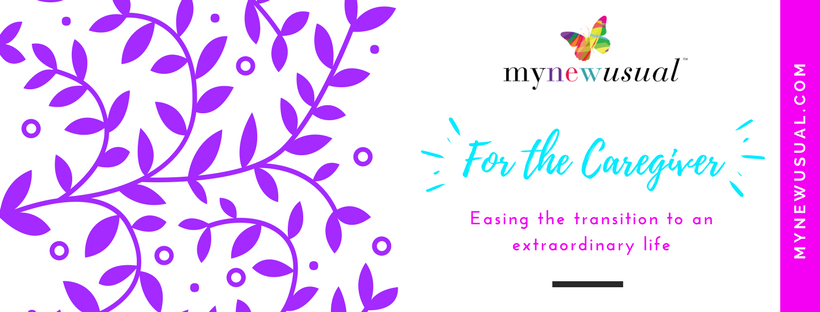
A Story to Share: For the Caregiver
We saw this story by author and journalist Sally Quinn that was published recently in the Washington Post. She’s been there, so she knows of what she speaks. Some of you do, too. Read on.
Love overcomes life’s inevitable sorrow
By Sally Quinn, Published: May 9
My 25th reunion at Smith College was the saddest event I had ever attended. What really got to me was the open-mike time, when we shared news about our lives. It was a litany of sorrows and tragedies: broken marriages, special-needs children, breast cancer, failed careers, deaths of loved ones. There were many tears.
About halfway through, I left to join my husband, Ben (20 years my senior), and my learning-disabled son, Quinn, for my nephew’s graduation in Hartford, Conn. That’s when I learned that my mother had had the first of many strokes that would leave her partially paralyzed and cognitively impaired.
At 46, life was upon me.
In contrast, my 10th reunion had been a blast. We were all full of energy and optimism, some newly married, starting families, beginning promising careers, looking forward to wonderful lives. I was a relatively new reporter at The Washington Post, and I wrote quite a funny piece about it all. I had intended to write about my 25th reunion but couldn’t bring myself to do it. What would I say? Life is hard?
I missed my 50th last year, when I was supposed to do a panel on “Spirituality in Our Seventies.” My husband, who now has dementia, had taken a turn for the worse, and I couldn’t go.
The Buddhists have a word, “dukkha,” which means suffering. But it means more than that. It means life. Life is suffering. We all suffer. Some obviously suffer more than others, but the truth is that nobody gets a pass.
So the question is: How do we lead happy and productive lives, given that we’re all in for it at some time or other? Why bother? What’s the point?
If you look for answers in the bookstore today, you’ll find plenty of options. But all of those Be Totally Happy books make it seem like unhappiness is an unnatural response to the struggle of life.
Most of them don’t really mention prayer. Meditation is about as far as they’ll go. (Perhaps for fear of turning off too many secular readers.) Yet when you see horrific stories in the news, inevitably the victims and their loved ones talk about the healing power of prayer.
Countless studies have shown that believers, especially as they age, are happier, live longer and heal faster than those who are not believers. But what about those who simply can’t believe? What should they do?
They should look for meaning.
Many of you have read Viktor Frankl’s incredible book, “Man’s Search for Meaning,” which he wrote after he survived Nazi concentration camps. In it, he concludes: “If there is a meaning in life at all, then there must be a meaning in suffering. Suffering is an ineradicable part of life, even as fate and death.”
Since starting OnFaith, I have interviewed many people about what gives their lives meaning. Some say their work, some their faith, some their families. Some are deeply religious. Some are spiritual. Some are atheists. All of them are searching for meaning.
My husband was part of the Grant Study at Harvard, which starting in 1938 examined nearly 300 “normal” male students, including Jack Kennedy. Every year, they fill out forms about their lives. George Vaillant, who led the study for many years, came to this conclusion about what made the subjects happy: “Happiness is love. Full stop.”
I will be 73 in seven weeks. My life has been full of happiness and full of sorrow. But it has always been full of love. I have a fabulous husband and a magical son. I have great friends. Together, we’ve found that love is not a one-way street. You have to be as loving as you wish to be loved.
Often people come to Washington and see it as a cold, unfeeling town where everyone is on the make. That’s true in a lot of ways. But it doesn’t have to be true for you if that’s not what you want.
When my husband stepped down as editor of The Washington Post, the director Sidney Lumet said to me: “How could you let Ben do this? Don’t you know that everyone in Washington will be scratching your names out of their little black books?” I told him, “Anyone who does that is not in my little black book to begin with.”
Now there is no greater joy than to spend time with my oldest friends and know what we have all been through together.
My work at OnFaith is my passion. But my family is the most important thing in my life. Taking care of my husband, my son and my mother has given me more spiritual satisfaction than I had ever hoped to have, no matter how difficult it has been and continues to be.
I love giving parties. To me, it’s about generosity of spirit. Nothing gives me more pleasure than getting friends together around a table with wine, candles, good food and good conversation.
I’ve been through a really rough patch lately. There have been days when I just didn’t see how I would make it through. What kept me going — the only thing, actually — was thinking of ways I could bring joy to somebody I loved or cared about. That’s the meaning of life, and the key to all true happiness.




